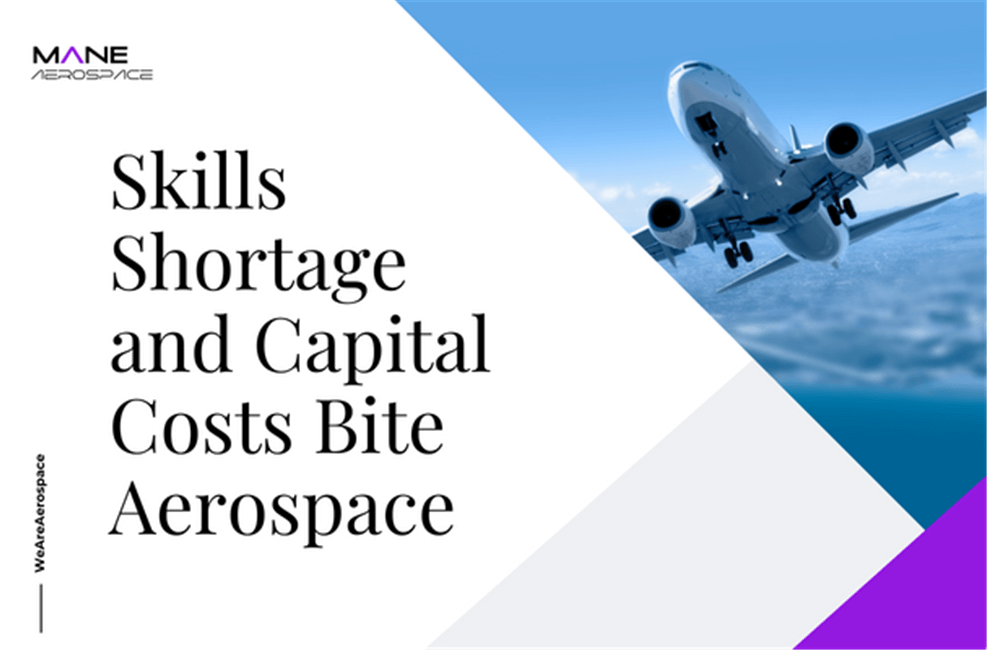Skills Shortage and Capital Costs Bite Aerospace
31 May, 202310 minsThe aerospace industry in the United Kingdom is facing significant challenges, primarily dri...

The aerospace industry in the United Kingdom is facing significant challenges, primarily driven by a shortage of skills and cost limitations. According to ADS, the country's trade association, the escalating inflation rates, exceeding 10 percent, and flying interest rates at 4.5 percent have become the most pressing concerns for UK aerospace and defence companies. These economic factors are impeding financial capabilities, making it difficult for companies to invest in addressing supply chain bottlenecks and hampering output and revenue growth. Despite these obstacles, there have been positive developments in the sector, including revenue growth and increased contribution to the UK economy.
Encouraging Revenue Growth and Economic Impact:
Despite the hurdles faced by the aerospace industry, the sector demonstrated progress in 2022 compared to the pandemic-affected year of 2021. Revenues in the aerospace sector increase by 20%, reaching £27 billion. Export values also increased by £3.4 billion, contributing significantly to the UK economy, with a value added of £10.9 billion.
Challenges of Investment and Skill Shortages:
The increasing costs of capital have made investment challenging for companies aiming to ramp up production rates, particularly in automation and new tooling. Kevin Craven, CEO of ADS, highlighted the struggle caused by higher capital costs during a recent press conference. Simultaneously, the aerospace sector faced a decline in direct employment, with approximately 3,000 less employees in 2022 compared to the previous year. The number of apprentices also decreased by 300 to 5,500, further exacerbating the skills shortage in the industry.
Unfilled Vacancies and Recruitment Priorities:
The ADS membership, spanning aerospace, defence, security, and space sectors, currently has over 10,000 unfilled job vacancies. Some of these openings resulted from downsizing in aerospace due to the unexpected decline in demand caused by the COVID-19 pandemic. ADS emphasises the importance of recruiting apprentices and graduates to bridge the skills gap. It also recognises that the official statistics may not capture the full extent of skilled workers serving in consultancy roles due to more flexible work arrangements.
Seeking Certainty on Post-Brexit Government Strategy:
ADS has urged the UK government to take several measures to alleviate the challenges faced by the industry. One such recommendation is to relax post-Brexit visa restrictions on skilled staff from EU countries. However, this remains a contentious issue within the ruling Conservative party, and strains on public finances may impact future support for research and development in the UK. Furthermore, the upcoming general election and the post-Brexit regulatory environment contribute to an uncertain business outlook, making it challenging for companies to plan for the future.
Regulatory Concerns and Resource Constraints:
The UK's withdrawal from the European Aviation Safety Agency and the unilateral modifications to EU law have raised concerns within ADS. These moves could complicate matters for their 1,200 member companies and affect their ability to compete in the market. The industry hopes for improved EU/UK relations but remains uncertain about the UK's continued participation in the EU's Horizon Europe research and development fund. Additionally, the Civil Aviation Authority, responsible for certification and regulatory tasks previously handled by the European Aviation Safety Agency, faces resource constraints, hindering efficient support for UK companies.
Positive Outlook and Recovery:
Despite the challenges, worldwide aircraft deliveries supported by ADS member companies have increased by nearly 10% in the first quarter of 2023. Although still less than pre-pandemic levels, ADS chief economist Aimie Stone predicts a stronger recovery throughout the year. However, the timing and impact of inflationary pressures on businesses remain uncertain.
The aerospace industry in the UK faces a dual challenge of skills shortages and cost limitations. The sector's growth and economic impact are hindered by the high levels of inflation and interest rates, making it difficult for companies to invest and overcome supply chain challenges. The shortage of skilled workers further compounds the industry's struggles, with thousands of job vacancies remaining unfilled.
To address these issues, the UK government must provide more certainty and support to the aerospace industry. This includes relaxing visa restrictions to attract skilled staff, ensuring adequate funding for research and development, and addressing regulatory concerns post-Brexit. Additionally, efforts should be made to promote apprenticeships and develop a skilled workforce for the future.
Despite the challenges, there are signs of recovery and positive momentum within the industry. Global aircraft deliveries are increasing, and there is optimism for a stronger rebound by the end of the year. However, the industry's path to recovery remains uncertain due to the volatile economic landscape and ongoing uncertainties surrounding Brexit.
The UK aerospace industry plays a crucial role in the country's economy and international competitiveness. It is imperative for stakeholders to collaborate and find innovative solutions to overcome the skills shortage and cost limitations. By investing in skills development, fostering favourable business conditions, and addressing regulatory concerns, the industry can regain its momentum and continue to thrive in the global aerospace market.


